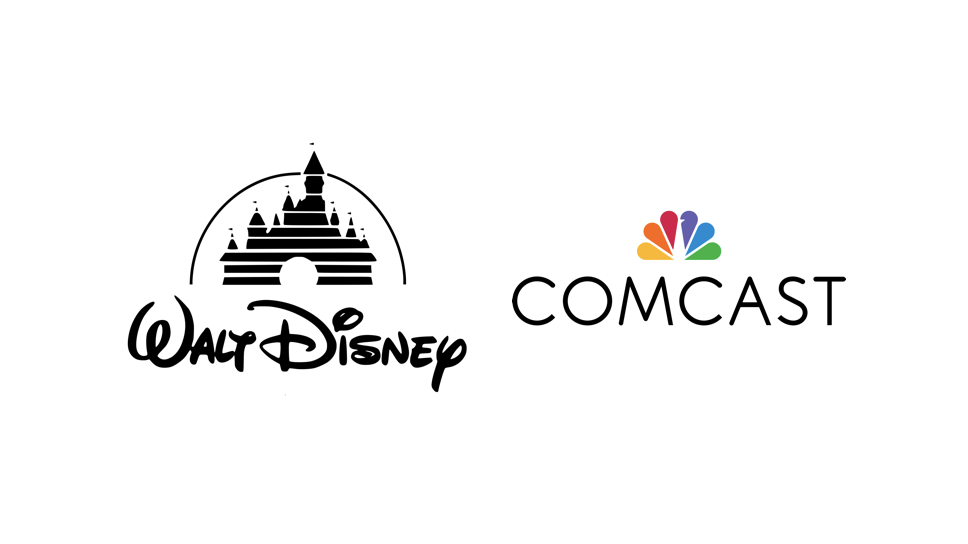
Disney and Comcast Bidding War for Fox, Sky: What It Means for Dividend Investors
The short but heated bidding war between Comcast (CMCSA) and Disney (DIS) for most of Twentieth-Century Fox’s (FOX.A) assets is now mostly over. However, the M&A drama isn't truly done, at least not globally.
Let’s take a look at Comcast's decision to give up on its bid, why Comcast continues to battle Disney to buy Sky, and what it might mean for dividend investors in both companies.
Why Comcast Gave Up Its Bidding War For Fox
There were two main reasons that Comcast bid for Fox. The first was that Fox owns a number of highly prized assets including: film and TV studios, cable networks, a 30% stake in Hulu, a 39% stake in Sky Europe (Europe’s largest pay T provider), and 100% of Star India (58 channels in eight languages, reaching an audience of 650 million people per month).
Comcast was especially interested in adding Fox’s strong content to help it battle the secular decline of cord cutting which has been hurting its cable TV business. Acquiring Fox’s stake in Hulu (the second biggest streaming provider in the U.S.) and adding to its own 30% stake would have given it a controlling interest and allowed it to become a leader in U.S. streaming.
In addition, Comcast wanted to become a more international company, which is why Fox’s Sky stake and STAR India assets were so valuable to it’s long-term growth plans. In fact, at the same time as Comcast was bidding for Fox, it also offered to pay $31 billion to acquire the remaining 69% portion of Sky.
In addition, Comcast wanted to become a more international company, which is why Fox’s Sky stake and STAR India assets were so valuable to it’s long-term growth plans. In fact, at the same time as Comcast was bidding for Fox, it also offered to pay $31 billion to acquire the remaining 69% portion of Sky.
The second reason for Comcast entering into this bidding war with Disney was the AT&T and Time Warner merger being approved. Comcast believed that the judge’s ruling in that case (incredibly adamant that the DOJ was wrong to try to block it) meant that it now had a very good chance to get the deal past regulators.
This is why soon after the AT&T merger was approved Comcast made a $65 billion all cash offer to buy Fox, topping Disney’s earlier $52.4 billion all stock deal. Disney countered with a $71 billion offer, with shareholders being able to choose to be paid up to 50% in cash and 50% in Disney stock.
This is why soon after the AT&T merger was approved Comcast made a $65 billion all cash offer to buy Fox, topping Disney’s earlier $52.4 billion all stock deal. Disney countered with a $71 billion offer, with shareholders being able to choose to be paid up to 50% in cash and 50% in Disney stock.
Rumors quickly came out that Comcast was negotiating with a consortium of banks to potentially raise its all cash offer to $90 billion, almost all which would be financed with debt. However, then two important things happened that caused Comcast to drop out of the bidding war.
The first was that the Department of Justice decided to challenge AT&T’s acquisition of Time Warner after all (despite the merger closing over one month ago). This once more created regulatory uncertainty about whether or not the deal could actually pass regulatory scrutiny.
Meanwhile, Federal regulators granted Disney final approval to buy Fox, with the provision that it divest that company’s regional sports networks. Regulators believed that combining ESPN with those networks created antitrust concerns.
Meanwhile, Federal regulators granted Disney final approval to buy Fox, with the provision that it divest that company’s regional sports networks. Regulators believed that combining ESPN with those networks created antitrust concerns.
With Comcast’s debt burden already being about $67 billion, and with Fox’s and Sky’s net debt being about $13 billion and $11 billion, respectively, this mean that if Comcast were to raise its bid to $90 billion, then it might have pushed its debt levels to $181 billion, the highest in corporate America.
This would have almost certainly forced it to slow or even freeze its dividend which had been growing at 14% annually over the past five years and which the company just hiked 19% for 2018. A dividend freeze would help the firm more quickly deleverage its balance sheet .
Another factor might be that Rupert Murdoch, founder of Fox, owns 14% of its shares but controls 40% of the voting rights (through a dual class structure). Murdoch likes the tax benefits of a partial stock deal which would greatly reduce his tax burden from any merger.
This would have almost certainly forced it to slow or even freeze its dividend which had been growing at 14% annually over the past five years and which the company just hiked 19% for 2018. A dividend freeze would help the firm more quickly deleverage its balance sheet .
Another factor might be that Rupert Murdoch, founder of Fox, owns 14% of its shares but controls 40% of the voting rights (through a dual class structure). Murdoch likes the tax benefits of a partial stock deal which would greatly reduce his tax burden from any merger.
As a result, it now seems that Disney is going to be acquiring Fox in a $71 billion mega deal. How much debt/share dilution the company faces will ultimately come down to how investors choose to take their payout.
However, it’s certain that Disney’s debt will increase substantially when this deal closes soon. Meanwhile, the bidding war between Disney and Comcast, while over in America, continues to rage in Europe.
However, it’s certain that Disney’s debt will increase substantially when this deal closes soon. Meanwhile, the bidding war between Disney and Comcast, while over in America, continues to rage in Europe.
The Bidding War For Sky Continues
With the threat of having to potentially take on $103 billion in new debt (including Fox debt assumption) to buy Fox’s assets now gone, Comcast is free to ramp up its bidding war for Sky.
On July 11, 2018, Fox, 39% owner of Sky, increased its own bid for Sky to $32.5 billion. Regulators have already approved Fox buying the rest of Sky. The very next day, Comcast made a $34 billion bid for Sky, beating Fox’s offer (which is effectively a Disney bid now) by $1.5 billion. Like all its offers to date, the Comcast bid was cash (debt funded), and Comcast also recently received EU regulatory approval to acquire Sky.
On July 11, 2018, Fox, 39% owner of Sky, increased its own bid for Sky to $32.5 billion. Regulators have already approved Fox buying the rest of Sky. The very next day, Comcast made a $34 billion bid for Sky, beating Fox’s offer (which is effectively a Disney bid now) by $1.5 billion. Like all its offers to date, the Comcast bid was cash (debt funded), and Comcast also recently received EU regulatory approval to acquire Sky.
Thus, while the bidding war between these two media giants (Disney and Comcast) is now over in the U.S., it continues to heat up in Europe. What implications does this have for dividend investors in both companies?
What It Means For Dividend Investors In Both Companies
Since Disney will be acquiring Fox soon (analysts believe deal will close by end of 2018) and assuming its debt, investors do need to be concerned with how much Fox will be willing to pay for Sky. That’s because the Fox offer is also mostly cash, which means it will be funded with debt.
With Sky having about $11 billion in net debt at the moment, this means that Fox acquiring Sky would result in $6.5 billion in net debt assumption, on top of whatever the company offers in a winning bid.
For example, if Fox were to outbid Comcast with a $35 billion winning bid, then it would increase its net debt position by approximately $41 billion to about $54 billion. When the Disney merger closes this means that Disney’s debt position might potentially increase to $115 billion (depending on how shareholders accept their payment).
For example, if Fox were to outbid Comcast with a $35 billion winning bid, then it would increase its net debt position by approximately $41 billion to about $54 billion. When the Disney merger closes this means that Disney’s debt position might potentially increase to $115 billion (depending on how shareholders accept their payment).
That would potentially place Disney in the unenviable position of having to freeze its dividend while it uses its increased free cash flow to rapidly deleverage. Fortunately, the dividend would likely remain safe, because Disney has paid an uninterrupted dividend for over 25 straight years and likely wouldn’t want to see that streak broken.
The bottom line is that in the Disney versus Comcast bidding war, the tables seem to have turned. With Disney now having won the bidding war for Fox, Comcast is free to likely outbid Fox (proxy for Disney) for Sky. What's more, the risk to Comcast's own dividend safety and growth prospects have now fallen substantially, even if it continues upping its bid for Sky.
While Disney would certainly love to own the rest of Sky (CEO Robert Iger has called Sky the “crown jewel" of Fox assets), in terms of long-term dividend safety and growth it’s likely best that Disney lets Comcast win that smaller merger battle.
After all, while Disney’s debt levels will rise significantly after buying Fox, the company’s much lower debt levels pre-merger means that once the deal closes Disney investors are likely to continue to see consistent annual dividend growth from that company.
Depending on how the deal is ultimately paid for, that growth may slow a bit for a few years, but Disney will likely continue to be an excellent long-term income growth investment. Especially with the bevy of new high-quality assets (including increased exposure to India’s booming economy and population) it will be gaining from the acquisition.
After all, while Disney’s debt levels will rise significantly after buying Fox, the company’s much lower debt levels pre-merger means that once the deal closes Disney investors are likely to continue to see consistent annual dividend growth from that company.
Depending on how the deal is ultimately paid for, that growth may slow a bit for a few years, but Disney will likely continue to be an excellent long-term income growth investment. Especially with the bevy of new high-quality assets (including increased exposure to India’s booming economy and population) it will be gaining from the acquisition.


